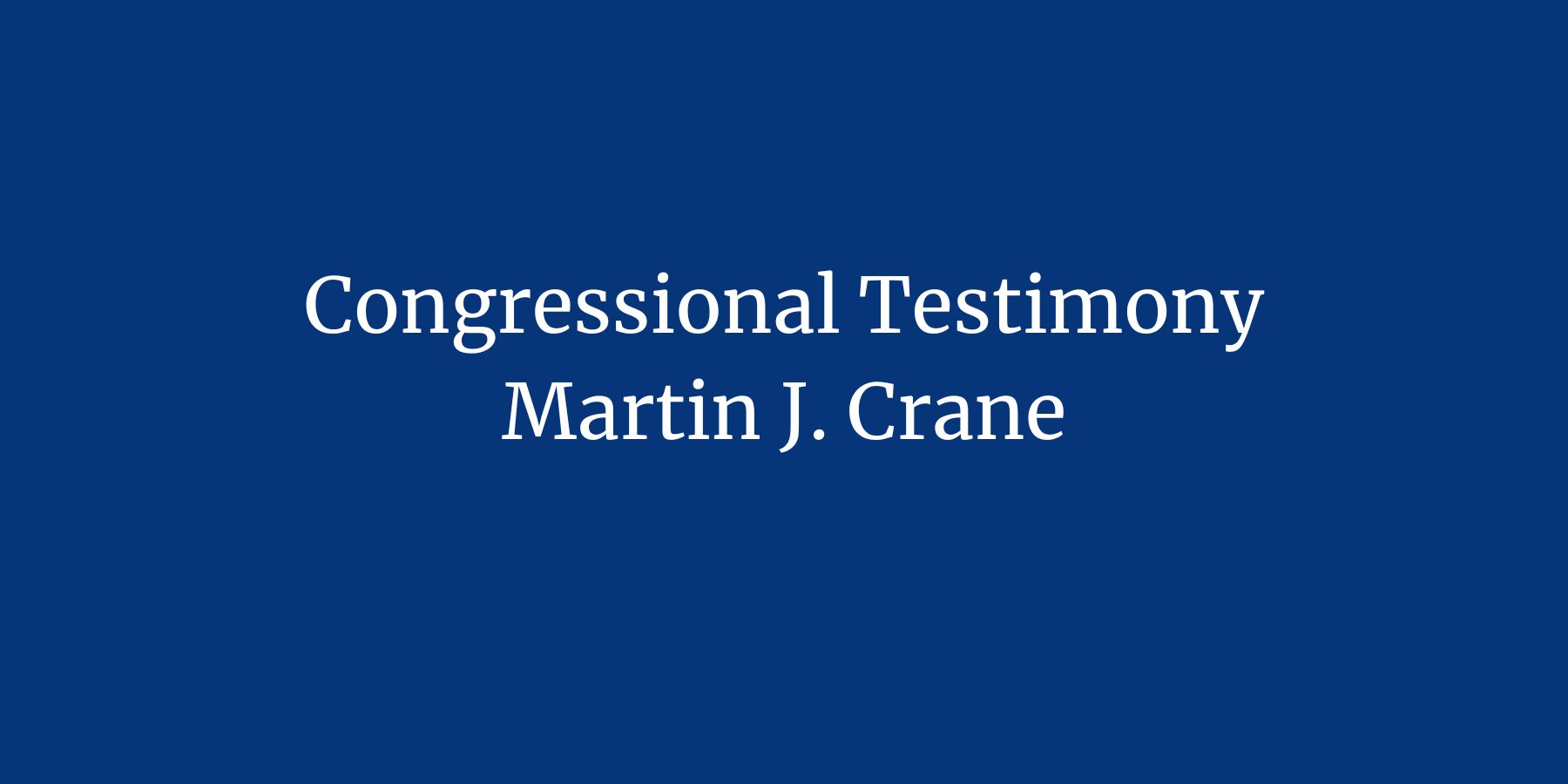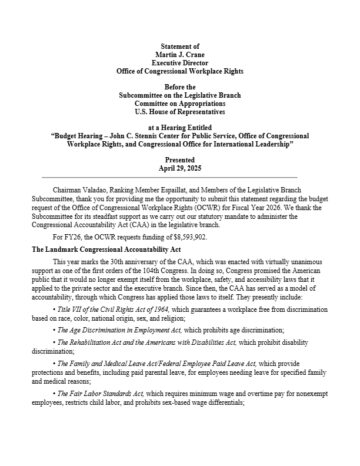Chairman Valadao, Ranking Member Espaillat, and Members of the Legislative Branch Subcommittee, thank you for providing me the opportunity to submit this statement regarding the budget request of the Office of Congressional Workplace Rights (OCWR) for Fiscal Year 2026. We thank the Subcommittee for its steadfast support as we carry out our statutory mandate to administer the Congressional Accountability Act (CAA) in the legislative branch.
For FY26, the OCWR requests funding of $8,593,902.
The Landmark Congressional Accountability Act
This year marks the 30th anniversary of the CAA, which was enacted with virtually unanimous support as one of the first orders of the 104th Congress. In doing so, Congress promised the American public that it would no longer exempt itself from the workplace, safety, and accessibility laws that it applied to the private sector and the executive branch. Since then, the CAA has served as a model of accountability, through which Congress has applied those laws to itself. They presently include:
- Title VII of the Civil Rights Act of 1964, which guarantees a workplace free from discrimination based on race, color, national origin, sex, and religion;
- The Age Discrimination in Employment Act, which prohibits age discrimination;
- The Rehabilitation Act and the Americans with Disabilities Act, which prohibit disability discrimination;
- The Family and Medical Leave Act/Federal Employee Paid Leave Act, which provide protections and benefits, including paid parental leave, for employees needing leave for specified family and medical reasons;
- The Fair Labor Standards Act, which requires minimum wage and overtime pay for nonexempt employees, restricts child labor, and prohibits sex-based wage differentials;
- The Employee Polygraph Protection Act, which restricts the use and the results of polygraph testing;
- The Worker Adjustment and Retraining Notification Act, which requires that employees be notified of office closings or mass layoffs;
- The Uniformed Services Employment and Reemployment Rights Act, which protects past or present members of the uniformed services from discrimination or retaliation and provides certain benefits and reemployment rights;
- The Veterans Employment Opportunities Act, which enhances access for eligible veterans to job opportunities and establishes a redress system if their veterans’ preference rights are violated;
- The Occupational Safety and Health Act, which requires employing offices to comply with occupational safety and health standards and to provide workplaces free of recognized hazards;
- The Federal Service Labor-Management Relations Statute, which allows certain legislative branch employees the right to form, join, or assist a labor organization or to refrain from such activity;
- The Genetic Information Nondiscrimination Act, which prohibits the use of genetic information as a basis for taking a personnel action;
- The Fair Chance to Compete for Jobs Act, which prohibits employing offices from asking most job applicants about their criminal history prior to extending conditional offers of employment;
- The Pregnant Workers Fairness Act, which requires employers to provide reasonable accommodations for an employee’s known limitations related to pregnancy, childbirth, or related medical conditions; and
- The anti-retaliation provisions of the CAA, which prohibit intimidation, reprisal, or discrimination against employees who exercise their rights under the CAA.
More recently, the 115th Congress unanimously passed the CAA Reform Act in 2018, thereby renewing its pledge and reaffirming its unwavering commitment to the principles embodied in the CAA.
The OCWR’s Role and Operations
Congress established the OCWR as the independent office of the House and the Senate that implements the CAA in the legislative branch. Although the OCWR is a small office, its mandate is broad, and its work is essential for Congress to ensure that its promise of accountability is matched by action.
The OCWR strives to serve as a steward for government efficiency. With just 34 authorized FTEs, the OCWR performs many of the functions performed by several executive branch agencies, such as the Equal Employment Opportunity Commission, the Federal Labor Relations Authority, the Occupational Safety and Health Administration, and other components of the Departments of Labor and Justice.
The OCWR has fulfilled its ongoing mandate over the years on an operating budget that is a fraction of that of the smallest of these agencies.
The OCWR has one program—to administer the CAA. To achieve our mandate, the OCWR operates several distinct but complimentary subprograms. As required by the CAA:
- We develop and provide outreach, education, and training to the congressional community, which fosters hazard-free and accessible workplaces free from unlawful employment practices. In FY25 the OCWR significantly updated its CAA training videos, each focusing on specific employment rights and procedures under the CAA. In FY24 and into FY25, the OCWR also launched its in-house Learning Management System (LMS) on ocwr.gov as part of our continuing commitment to provide outstanding and up-to-date education modules and training options for the legislative branch community. Managing the LMS internally offers several advantages, including substantial cost savings, the flexibility to instantaneously implement legal updates as needed, and the ability to create and upload new training modules continuously.
- Our Board of Directors submits to each Congress a report of recommended actions to ensure that the protections and responsibilities applied through the CAA are equivalent to those applicable to the private sector and the executive branch. In FY25, the Board submitted its recommendations for consideration by the incoming 119th Congress, which are also available on ocwr.gov.
- Our OCWR Office of General Counsel (OGC) investigates alleged violations of laws governing hazard-free workplaces, accessibility, and labor relations; works with stakeholders to resolve alleged violations; and prosecutes violations of such laws. Each Congress, OGC also inspects more than 18 million square feet of facilities and grounds in the legislative branch to ensure that they are and remain hazard-free and accessible. In FY24 and FY25, OGC continued to assist legislative branch employing offices by developing and hosting nine presentations involving key issues and developments under the laws applied by the CAA. In FY25, OGC also worked with the USCP to increase awareness among constituents and visitors regarding the security screening procedures for Capitol Hill facilities, including procedures for individuals with disabilities.
- The OCWR administers the statutorily required biennial Congressional Workplace Climate Survey to more than 30,000 legislative branch employees, which assesses the workplace environment, including attitudes regarding sexual harassment. The survey for the 118th Congress closed in FY24, and preparations have commenced for the next survey, which will be conducted in FY26.
- We provide privileged and confidential advice to covered employees about their rights and responsibilities under the CAA. In FY24, employee requests for confidential advice and information reached an all-time high since the enactment of the CAA Reform Act.
- We operate an Administrative Dispute Resolution (ADR) program, which includes voluntary mediation and administrative hearings, to resolve claims alleging violations of the laws incorporated by the CAA. In FY25, the office continues to process claims in an efficient and timely manner, meeting all statutory deadlines, and operating without a backlog.
The OCWR’s FY 2026 Budget Request
The OCWR’s zero-based budget request for FY26 focuses on its statutory mandates and on improving the delivery of services to legislative branch stakeholders. It does not embody any significant new program areas or large-scale initiatives.
Personnel Costs
The OCWR depends heavily on its FTEs to accomplish its varied mission. As a result, the majority of the OCWR’s annual budget is for personnel costs, including pay and benefits, for OCWR staff. More than 80 percent of the OCWR’s FY26 budget request is for projected costs associated with 34 authorized full-time FTEs, which includes the five part-time Board members, who serve on a “when-actually-employed” basis and together comprise one of the FTEs. Our request incorporates a 3.8% across-the-board pay increase based on Congressional Budget Office projections.
Non-personnel Costs
The remaining approximately 17% of the OCWR’s budget request is for non-personnel costs. These costs include pay for contract services, equipment, and supplies needed to operate the OCWR. They also cover costs associated with our interagency agreements for services provided to the OCWR by partner federal agencies, including the Library of Congress and the National Finance Center. The OCWR’s non-personnel costs have significantly decreased since FY24, and we expect this trend to continue in FY26. Therefore, the OCWR requests approximately $1.5 million for non-personnel costs. I highlight some of the especially significant non-personnel costs below:
Education and Training
As stated above, among the OCWR’s significant responsibilities is its statutory mandate to provide a program to educate Members of Congress and legislative branch staff on their rights and responsibilities under the CAA. OCWR trainers deliver remote and in-person training sessions tailored to meet the unique needs of legislative branch stakeholders. Demand for OCWR training and outreach services continues to increase, and the OCWR has continued to enhance its training program, delivering new and informative modules via web-conferencing, in-person sessions, and on-line videos.
The OCWR requests $45,000 for non-personnel services for FY26 to facilitate OCWR staff in support of this program.
Administrative Dispute Resolution
The OCWR requests $400,000 for non-personnel services for FY26 for the administration of its ADR processes. This amount includes funding to pay the contract rates for our hearing officers and mediators. It also includes funding for technical services and necessary updates to support the operation of the ADR e-filing system.* With respect to the ADR non-personnel cost projection, we note that it is impossible to predict with certainty the number of cases claimants will file with the OCWR’s ADR program each year. Considering that, we based the ADR non-personnel estimate upon average actual expenditures from FY21 through FY24. Although we believe that relying on FY21 through FY24 as guides for FY26 is reasonable, there is some risk that the number of cases could climb, or fall, from the caseload that sustained the FY21 through FY24 costs.
General Information Technology/Communications/Web Services
IT modernization and security continues to be a key focus for the OCWR. The OCWR administers a local area network and the hardware and software required to support the network. The OCWR requests approximately $793,000 for non-personnel services for FY26 for information technology equipment and operations. These non-personnel costs cover the necessary equipment, contractor, and interagency agreement costs to facilitate these efforts, which are in addition to the costs specifically for contractor support of the ADR e-filing system.
Inspecting Legislative Branch Facilities
As stated above, the OGC is responsible for inspecting all facilities in the legislative branch for occupational safety and health violations at least once each Congress. The OGC is also responsible for inspecting the public areas of all facilities in the legislative branch for compliance with titles II and III of the Americans with Disabilities Act. The OCWR has been able to hire experienced safety professionals as FTEs who perform inspections and investigations previously performed by contractors and service providers. As such, the non-personnel allocation for inspections for FY26 includes $50,000.
Conclusion
The OCWR is committed to executing our crucial mission in the coming fiscal year. I believe this budget request will allow the OCWR to succeed while remaining efficient and serving as a responsible steward of taxpayer’s money. As such, I respectfully ask for your support of this request. I look forward to providing this Subcommittee with any additional information it may require at this hearing and the coming days as part of the appropriations process.
Thank you.
*The requested amount does not include non-personnel costs associated with the Board of Directors’ function as the reviewing body for claims that are appealed from OCWR hearing officers under the ADR program.

